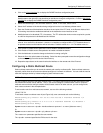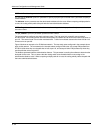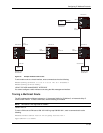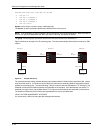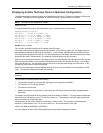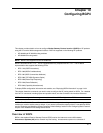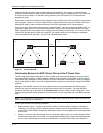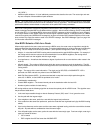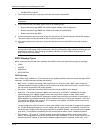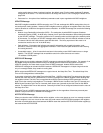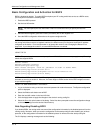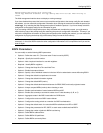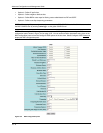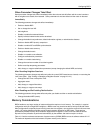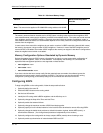
Configuring BGP4
“AS_PATH”.)
• Additional path attributes – A list of additional parameters that describe the route. The route origin and next
hop are examples of these additional path attributes.
NOTE: The routing switch re-advertises a learned best BGP4 route to the routing switch’s neighbors even when
the software does not also select that route for installation in the IP route table. The best BGP4 route is the BGP4
path that the software selects based on comparison of the paths’ BGP4 route parameters.
After an HP routing switch successfully negotiates a BGP4 session with a neighbor (a BGP4 peer), the HP routing
switch exchanges complete BGP4 route tables with the neighbor. After this initial exchange, the HP routing switch
and all other RFC 1771-compliant BGP4 routers send UPDATE messages to inform neighbors of new, changed,
or no longer feasible routes. BGP4 routers do not send regular updates. However, if configured to do so, a BGP4
router does regularly send KEEPALIVE messages to its peers to maintain BGP4 sessions with them if the router
does not have any route information to send in an UPDATE message. See “BGP4 Message Types” on page 10-4
for information about BGP4 messages.
How BGP4 Selects a Path for a Route
When multiple paths for the same route are known to a BGP4 router, the router uses an algorithm to weigh the
paths and determine the optimal path for the route. The optimal path depends on various parameters including the
following. You can modify some of these parameters. (See “Optional Configuration Tasks” on page 10-23.)
• Weight – A value that the HP BGP4 routing switch associates with a specific BGP4 neighbor. For example, if
the routing switch receives routes to the same destination from two BGP4 neighbors, the routing switch
prefers the route from the neighbor with the larger weight.
• Local preference – An attribute that indicates a degree of preference for a route relative to other routes in the
local AS.
• AS-path length – The number of ASs through which the route must pass to reach the destination. The AS-
path is a sequential list of the AS numbers through which the route information has passed to reach the BGP4
routing switch.
• Origin – The source of the route information. The origin can be IGP, EGP, or INCOMPLETE. IGP is
preferred over EGP and both are preferred over INCOMPLETE.
• Multi-Exit Discriminator (MED) – A value associated with routes that have multiple paths through the
same AS. In BGP4, a route’s MED is equivalent to its “metric”.
• Confederation membership.
• Closest IBGP neighbor – The closest internal path to the destination within the local AS.
• Number of paths available for load sharing.
HP routing switches use the following algorithm to choose the optimal path for a BGP4 route. The algorithm uses
the parameters listed above.
1. Is the next hop accessible though an Interior Gateway Protocol (IGP) route? If not, ignore the route.
2. Use the path with the largest weight.
3. If the weights are the same, prefer the route with the largest local preference.
4. If the routes have the same local preference, prefer the route that was originated locally (by this BGP4 routing
switch).
5. If the local preferences are the same and the routes were originated locally, prefer the route with the shortest
AS-path. All paths within a confederation have the same length.
6. If the AS-path lengths are the same, prefer the route with the lowest origin type. From low to high, route origin
types are valued as follows:
• IGP is lowest
• EGP is higher than IGP but lower than INCOMPLETE
10 - 3



